Fenn College On-Line
Fenn College School of Arts and Sciences
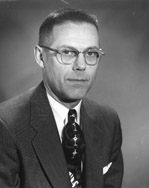
Dr. Major B. Jenks, Dean of Arts & Sciences.
The School of Arts and Sciences educates men and women for careers useful to both the individual and society. It seeks to graduate students enlightened in purpose and capable of responsible judgment - students who know themselves and society, who will use this knowledge to further the highest aspirations of man, as well as their own ends. Through general requirements and electives in the natural and social sciences, the humanities, modern languages, and the fine arts, the School attempts to build character while preparing students for effective performance in their chosen fields.
Such training embodies the most cherished ideals of society, especially those of service, initiative, benevolence, objectivity, and self-direction. Men and women educated in this liberal tradition know how to live and work harmoniously with others. Because they are willing to assume the ethical and moral responsibilities that go with a liberal education of this kind, they are indespensable to modern society.
The Bachelor of Science degree is awarded in biology, chemistry, mathematics, and general science. The Bachelor of Science is conferred in elementary education. The Bachelor of Arts degree is conferred upon satisfactory completion of requirements for majors in economics, English, history, philosophy, psychology, sociology, and social science. In addition to these degree programs, the School of Arts & Sciences offer professional and pre-professional programs in teacher training, medicine, dentistry, and laboratory technology.
The School of Arts & Sciences confers its degrees upon satisfactory completion of the following requirements:
Volume of Work - A minimum of 180 credit hours of academic work and 6 to 8 cooperative work quarters.
Quality of Work - An accumulation of quality points totaling 2.0 times the number of credit hours taken.
Major Field - A major consists of at least 36 credit hours earned in one department. a "composite major" includes 60 credit hours with at least 20 hours earned in each of two departments. Students may also select one or two minor fields. Choice of a major field may be made at the beginning of the sophmore year and not later than the beginning of the pre-junior year.
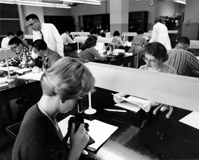
Dr. Frank DeMarinis - Biology lab, Stilwell Hall.
BIOLOGY - The field of biology provides opportunties for students interested in research in the biological sciences in a wide variety of positions in industry or government, medicine, and high school or college teaching.
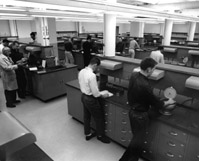
Dr. Lad Pasuit - Chemistry lab, Stilwell Hall.
CHEMISTRY - The rapidly expanding chemical industry offers many and varied positions for those with a broad basic training as provided in this program. In addition to providing a well-rounded background in the liberal arts, the program offers solid foundation in chemistry, mathematics, and the related sciences.
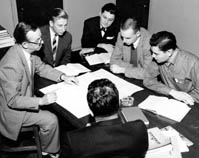
Dr. John McGrew - Economics class.
ECONOMICS provides background for persons planning to enter the general field of business as well as those interested in graduate study in the field of economics. Such training is particularly valuable for those seeking employment in private and governmental agencies engaged in business research, as well as in all areas of business management.
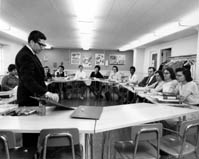
Dr. Gordon E. Samson - Elementary Education class.
ELEMENTARY EDUCATION - The elementary schools are currently facing an acute shortage of trained teachers. This shortage has existed and will continue through the foreseeable future. Persons who are interested in working with children and have the proper academic and personal qualifications will find this a most attractive field.
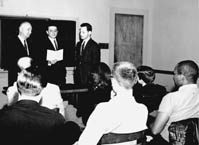
Professor Lewis Turco - Creative Writing class.
ENGLISH - In addition to the English requirements of the Arts & Sciences Schools the major in English includes two courses in advanced composition; one course in American literature; and ten other courses in English literature, six of which must be in literature before 1830.
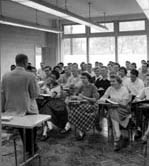
Dr. Joseph W. Ink - History class.
HISTORY - Training in the historical method involves the weighing of evidence, the ability to discern cause and effect relations, and the ability to generalize from relevant facts. Such training is excellent for those interested in teaching, politics, journalism, radio, law, library work, and business positions where the ability to analyze problems and make decisions is important.
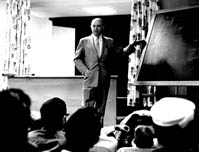
Dr. Blake Crider - Psychology class.
PSYCHOLOGY - Students intending to go to graduate school for the purpose of becoming professional psychologists should consult with their adviser relative to requirements, qualifying examinations, and procedures for applying to graduate school.
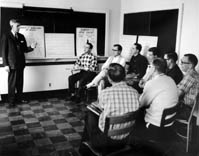
Professor Millard Jordan - Sociology class.
SOCIOLOGY is especially useful to those interested in social service, welfare work, and many positions in the civil service of federal, state, and local governments. Family social work, child welfare, work with juvenile delinquents, group work, and social agency work make up a field of employment that is growing in importance and professional recognition.
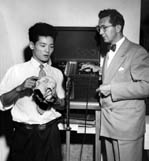
Professor George Srail - Speech class.
MATHEMATICS is the basic science upon which all of the physical sciences rest. In addition, it has many applications in those fields in which the use of statistics and statistical analysis are increasingly important. Government is dependent upon the services of trained mathematicians in its collection and analysis of a variety of statistical information. The industrial production department, insurance company, statistical office, and space laboratory are examples of the many areas that require the knowledge and skills of a mathematician.
PHILOSOPHY is the foundation of all knowledge and its application. The philosopher deals with all areas of human experience in the attempt to weld these areas into one coherent whole. The basic purposes of this curriculum are to stimulate the student to think, to formulate and evaluate his "philosophy of life". and to formulate approaches to the basic problems of mankind. Such training is highly beneficial for any endeavor, especially in those areas of the academic and business world in which decision making is dependent on the careful evaluation of data.



